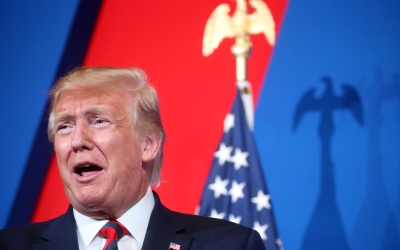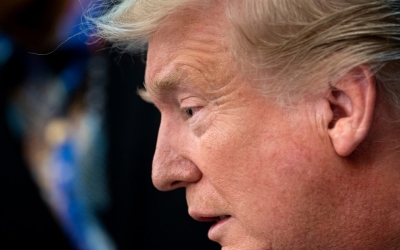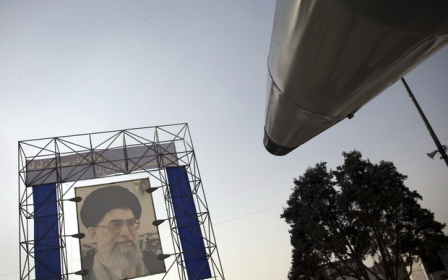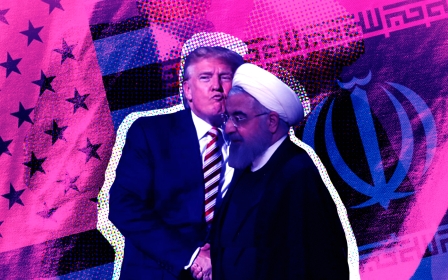Can Trump strike Iran without congressional consent?

A recent surge in tensions between the US and Iran has rekindled debate about the extent of the president's war powers and whether President Donald Trump needs congressional approval to use military force against what his administration deems "the world's leading state sponsor of terror".
With tensions increasing in the Gulf, the president's brinkmanship with Iran has raised fear of an all-out war that could devastate the Middle East.
While Democrats have been vocal in warning that any military strike against Iran would first need to go through Congress, Trump may be able to bypass any constitutional restrictions by using numerous historical precedents of past presidents taking military matters into their own hands.
"There's a pretty clear-cut legal case, from the perspective of the executive branch, that if Trump were to take military action against Iran, it would be consistent with what the executive branch's authority is," Scott Anderson, a fellow at the Washington-based think-tank Brookings Institution, told Middle East Eye.
Does Trump need Congress?
Stay informed with MEE's newsletters
Sign up to get the latest alerts, insights and analysis, starting with Turkey Unpacked
On Sunday evening, Trump said US forces were "locked and loaded" to strike the culprit behind the attacks on Saudi oil plants that occurred over the weekend, with fingers pointed straight at Tehran.
Democratic critics were quick to denounce his remarks, stressing that only Congress has the authority to declare war.
"Mr Trump, the Constitution of the United States is perfectly clear. Only Congress - not the president - can declare war," said Senator Bernie Sanders, who is running for president.
"And Congress will not give you the authority to start another disastrous war in the Middle East just because the brutal Saudi dictatorship told you to."
The backlash has led many to ponder: Can Trump go to war with Iran without Congress's approval?
Trump said in an interview with The Hill in June that he did not need congressional approval to strike Iran; however, he would like to keep Congress informed of his decisions.
Democratic leaders, including Sanders and House Speaker Nancy Pelosi, have cited Article 1 of the US Constitution, which states that Congress has the authority to declare war, as the argument for Trump needing their approval to use military force.
"Democratic Leaders emphasized that hostilities must not be initiated without the approval of Congress," Pelosi said in June, after Trump ordered, then cancelled, a military strike on Iran.
However, Article 2 gives the president unilateral authority to use military force overseas in support of the US national interest, according to Anderson, who is also a senior editor of the law blog Lawfare.
"While there are reasonable critiques of that legal theory one can make, it's pretty well established and part of the executive branch and several prior presidents have acted upon it," he said. "And Trump acting upon it wouldn't be that surprising."
'President Bush's successful bait-and-switch in Iraq has created a deeply troubling precedent that threatens the democratic check by Congress required by the Constitution'
- Yale professors Bruce Ackerman and Oona Hathaway
The War Powers Resolution of 1973 imposed some restrictions on the president's war powers.
The president must send a report to Congress within 48 hours after conducting any military operation. He would also need to withdraw forces from the area of operations within a 60-day period.
These rules have been broken before, as was the case in the Kosovo bombing campaign in 1999, in which then President Bill Clinton continued the military campaign well past the 60-day period, and for two months after the House failed to pass a bill authorising an air operation against Serbia.
The US invasion of Iraq was different, with former President George W Bush receiving limited authorisation to use military action against Baghdad, only to go for an all-out war that lasted years.
"President Bush's successful bait-and-switch in Iraq has created a deeply troubling precedent that threatens the democratic check by Congress required by the Constitution," Yale law professors Bruce Ackerman and Oona Hathaway wrote in an article for the journal Michigan Law Review.
This precedent of bypassing Congress was continued by former President Barack Obama when he ordered military strikes on Libya in 2011. Trump has ordered missile strikes on Syrian government targets twice without consulting the legislative body.
In the case of Libya, some Republicans criticised Obama, claiming that he needed to seek Congress's approval before using military force abroad. Now, Democrats are repeating similar rhetoric in opposition to Trump.
In 2014, Obama said he welcomed congressional support, but did not need Congress to authorise the use of force against the Islamic State (IS) group.
Despite verbal opposition from Capitol Hill, past US presidents have not been punished for circumventing the Senate and the House to launch military campaigns.
The undeclared wars
"Formal legality in such issues doesn't really matter," said Kamran Bokhari, director of the Washington-based Center for Global Policy think-tank and a course coordinator at the State Department's Foreign Service Institute.
"Congress has deferred military decisions to the White House numerous times," he told Middle East Eye.
The last time the US formally declared war against another country was in 1942 against the axis-allied nations of Bulgaria, Hungary and Romania during World War II.
Since then, Washington has used a myriad of methods to deploy troops abroad, including through United Nations peacekeeping efforts and joint congressional resolutions.
The Korean War, the Vietnam War, both Gulf wars, numerous interventions in Central and South America and the invasion of Afghanistan were all waged without formal declarations.
"A declaration of war is more of a formality. It's a tradition we have evolved beyond due to the changes in the global geopolitical landscape," Bokhari said.
Authorisation for Use of Military Force
Days after the 9/11 attacks, Congress passed Authorisation for Use of Military Force (AUMF), giving Bush broad war powers.
The measure enabled the president to use necessary force against any country, entity, or individual determined to have been responsible for the attacks.
Separate AUMFs were signed in 1991 and 2002 to approve the two Gulf wars, and in recent years to authorise US military presence in Syria and Iraq to fight IS.
'Declaration of war is more of a formality. It's a tradition that's sort of evolved due to the geopolitical landscape'
- Kamran Bokhari, director of Center for Global Policy
The AUMF passed in 2001 gave the White House sweeping powers to wage war against any of the perpetrators of the 9/11 attacks. The vagueness of the aforementioned enemy allowed the executive branch to expand military operations across the Middle East under the guise of fighting al-Qaeda, the Taliban and their associates.
The Obama administration further extended the AUMFs' reach by asserting that the authorisations were the equivalent of a declaration of war, Georgetown law professor Rosa Brooks said in a hearing before the Senate Armed Forces Committee in 2013.
The Trump administration has, however, already admitted that Iran was not behind the 9/11 attacks.
"While the President's constitutional authority as commander-in-chief is enormously important, determining the scope of that authority beyond what Congress has authorised implicates some of the most difficult, unresolved, and contested issues in constitutional law," professors Jack Goldsmith and Curtis Bradley wrote in an article for the journal Harvard Law Review.
Because of the precedents in place, the ambiguity of the law may work in Trump's favour if he decides to attack Iran.
That's why some Democrats are actively trying to tie the president's hands to prevent him from taking the country to war on his own.
Congressman Ro Khanna introduced an amendment to this year's National Defense Authorization Act (NDAA) to bar federal funds from being used for military force against Iran without congressional approval.
Lawmakers are also pushing to prevent the 2001 and 2002 AUMFs from being used to attack the Islamic Republic.
"The administration needs to brief Congress fully and if the president is considering military options, his first stop must be Capitol Hill, not Riyadh," said Congressman Eliot Engel, who chairs the House Foreign Affairs Committee.
Middle East Eye delivers independent and unrivalled coverage and analysis of the Middle East, North Africa and beyond. To learn more about republishing this content and the associated fees, please fill out this form. More about MEE can be found here.






